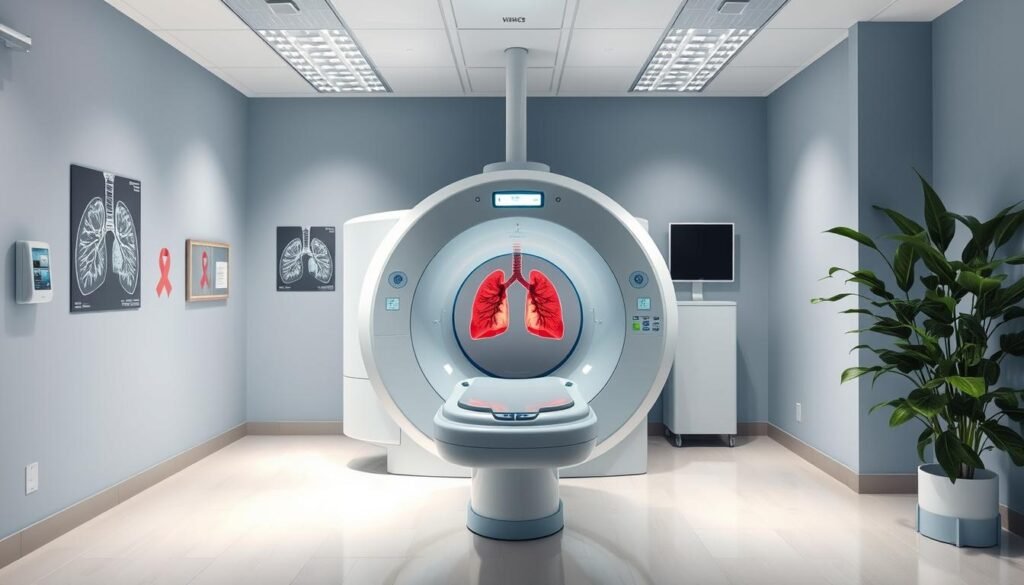Did you know that stopping smoking before turning 40 reduces your chances of dying from smoking-related diseases by up to 90%? This fact shows how vital it is to think about smoking’s health risks and the benefits of quitting. Smoking is not just bad for your overall health but is also a leading cause of lung cancer, making up about 85% of cases.
In this article, we dive into how stopping smoking lowers the risk of lung cancer over time. We’ll look at the immediate and long-term health benefits. Knowing this can help people make better choices about their health. It encourages them to take steps toward preventing lung cancer.
Key Takeaways
- Quitting smoking can lower the chance of dying from smoking-related diseases by 90% if stopped before age 40.
- Former smokers can gain up to 10 additional years of life compared to those who continue to smoke.
- The risk of developing lung cancer decreases significantly over time after quitting.
- Immediate improvements in taste, smell, and overall health occur right after quitting.
- Heart and lung problems, such as COPD and lung infections, diminish after smoking cessation.
- Annual lung cancer screenings are recommended for heavy smokers, particularly those who started young.
The Importance of Quitting Smoking
Smoking is bad for health, affecting smokers and those around them. Knowing the risks helps in making the choice to quit. Realizing that quitting can save your life may inspire you to stop and aim for a healthier life.
Understanding the Health Risks of Smoking
Smoking’s health dangers are severe and widespread. Lung cancer is the top cause of cancer deaths, and 75% die within five years of finding out they’re sick. Smokers die at a rate 68% higher than those who’ve never smoked. Even those who’ve stopped smoking still face a 26% higher chance of dying compared to non-smokers. Smoking leads to heart disease and stroke too.
Why Quitting is a Life-Saving Decision
Quitting smoking can greatly improve your health. Quitting by 40 lowers the risk of dying from smoking-related diseases by 90%. After quitting, within 10 years, the risk of lung cancer drops by 30% to 50%. Five years after quitting, the risks of mouth and esophagus cancer are cut in half. Quitting not only betters your life quality but also helps you live longer.
| Time After Quitting | Reduction in Lung Cancer Risk |
|---|---|
| 5 Years | Risk of mouth or esophagus cancer is halved |
| 10 Years | 30% to 50% lower risk of lung cancer |
| 15 Years | 14 times lower risk compared to heavy smokers |
| Over 25 Years | Risk is approximately 3.85 times greater than lifelong non-smokers |
How Smoking Causes Lung Cancer
Knowing how smoking leads to lung cancer is very important. It shows us the dangers we face. Smoking fills our lungs with harmful chemicals that can cause cancer.
The Mechanics of Tobacco-Related Cancer
Lung cancer comes from a buildup of damage in lung cells. This damage is due to carcinogens in cigarettes. When you smoke, you start harmful changes inside your cells.
These changes can lead to genetic damage. Over time, this can cause lung cancer. Smokers put themselves at high risk every time they light up.
The Role of Carcinogens in Cigarettes
Cigarettes have over 7,000 chemicals. Around 70 of these are known to cause cancer. These cancer-causing chemicals damage our DNA and affect the body’s repair system.
Every cigarette adds to this damage. It increases the chances of genetic mutations that may lead to lung cancer.
| Carcinogen | Effects |
|---|---|
| Benzo[a]pyrene | Creates DNA adducts, leading to mutations |
| Formaldehyde | Causes cellular damage and interferes with DNA repair |
| Arsenic | Increases likelihood of lung tumors |
| Nitrosamines | Promotes cell proliferation and mutation |
Stopping smoking is key to lower the risk of lung cancer. Knowing about these dangerous chemicals can help people make better health decisions.
How Quitting Smoking Reduces Lung Cancer Risk Over Time
Quitting smoking offers big benefits for your health. It starts with quick health wins. And then it leads to more good stuff over time. Knowing how it changes your health is really important.
The Immediate Benefits of Quitting
Right away, when you stop smoking, your body starts to get better. Here’s what happens:
- Carbon monoxide levels go down, so oxygen can go up within hours.
- Your blood flows better, and you can move more easily.
- Your good cholesterol goes up, which is great for your heart.
These early changes start you on a path to more good health later on.
Long-Term Improvements in Health
Stopping smoking lowers your chance of getting cancer a lot in the long run. Studies show:
- After 10 years smoke-free, your lung cancer risk drops a lot. It’s almost like you never smoked.
- 15 years later, your chance of getting any cancer is cut in half.
- You also have less chance of getting diseases like COPD, lung cancer, bladder cancer, and pancreatic cancer.
These gains show how quitting smoking is a big win for your health and life. It’s always a good decision.
The Effects of Quitting Smoking on Lung Function
Quitting smoking greatly improves lung function. It makes the respiratory system stronger. Once you decide to quit, you’ll quickly have less carbon monoxide in your blood. This drop is the start of many good changes for your respiratory health.
In just two weeks to three months, your lungs start working better. Better blood flow helps your body heal faster. After ten years, your chance of lung cancer can be half that of smokers. This shows the huge benefits of quitting smoking.
As lung capacity goes up, you’re less likely to get diseases like COPD. People who quit smoking breathe easier and can do more physically. This boosts how good their life is.

Stopping smoking leads to big improvements in lung and overall health. These benefits help you live longer and enjoy daily life more. Quitting smoking is a key step to a healthier respiratory system.
Research Supporting Smoking Cessation and Cancer Risk Reduction
Quitting smoking brings huge benefits for lowering cancer risk. Studies prove this. Many research projects show that quitting smoking lowers cancer risk. This part looks at key studies and numbers that show how quitting smoking helps your health.
Key Studies and Findings
Recent studies show strong proof that stopping smoking helps a lot. Heavy smokers who quit cut their cancer risk from smoking by 26% compared to those who kept smoking. Even moderate smokers who smoked less had an 18% lower risk of getting cancer. These findings show how important it is to quit smoking.
Statistics About Quitting and Cancer Risk
Statistics about quitting smoking underline its benefits. For example, in a study of people with early lung cancer who quit smoking, they lived about 22 months longer than those who didn’t stop smoking. This fact highlights the link between lowering cancer risk and quitting smoking.
| Smoking Status | Reduction in Smoking-Related Cancer Risk | Reduction in All Cancer Risk | Reduction in Lung Cancer Risk |
|---|---|---|---|
| Heavy Smokers Who Quit | 26% (HR 0.74) | 13% (HR 0.87) | N/A |
| Moderate Smokers Who Reduced to Light | 26% (HR 0.74) | 18% (HR 0.82) | 45% (HR 0.55) |
| Quitters After Lung Cancer Diagnosis | N/A | N/A | 22 Months Longer Survival |
Additional Health Benefits of Quitting Smoking
Quitting smoking brings many health gains beyond reducing lung cancer risks. People who stop smoking see vast improvements in health and live longer. They lower their chances of getting cancers like those of the throat, mouth, liver, and colon. Not smoking for each year helps cut overall cancer risk.
Reduction in Risks of Other Cancers
Stopping smoking greatly reduces the risk of many cancers. It especially lowers the chance of cervical cancer and kidney cancers. Also, smoking less each day can cut lung cancer risk by 20%. This shows how stopping smoking aids in cancer prevention. The link between chronic obstructive pulmonary disease (COPD) and lung cancer also shows the need to quit. To learn more about the symptoms they share, check out recent studies.
Improvement in Overall Health and Longevity
Quitting smoking also leads to a longer life. Right away, former smokers enjoy better taste and smell. Over time, their heart health improves, and stroke risk goes down, almost like non-smokers. Quitting also helps raise good cholesterol levels, lowering heart disease and attack risks. This is true even for people with heart problems. Giving up smoking keeps lungs working well, especially important for those at COPD risk. By choosing a smoke-free life, people see major health boosts and live longer, healthier lives.
How Age Influences Quitting and Cancer Risk
Age is key when it comes to quitting smoking. The sooner you quit, the better. Stopping young greatly improves your health.
Those who quit by 40 dodge much of the risk of smoking-related diseases.
Benefits of Quitting at a Younger Age
Quitting smoking early makes a big difference. Quitting from 15 to 34 avoids almost all cancer death risks. This helps you live longer and healthier.
Key benefits include:
- Better lung function right away.
- 95% of those quitting by 40 see major health gains.
- Reduced risk of heart and lung diseases.
- Less chance of getting cancer, like lung cancer.
Young quitters see the best health changes. The American Cancer Society shows how early stop reduces cancer risks.
Learn more about early cessation benefits
The Impacts of Quitting After Age 50
Older adults also benefit from quitting. Stopping after 50 makes health much better, including less lung cancer risk.
Benefits for those quitting after 50 include:
- Noticeably lower lung cancer risk over time.
- Better breathing health.
- Fewer risks of heart disease and other illnesses.
- Longer life than those who keep smoking.
Quitting later still cuts health risks a lot. Studies show big benefits even after 50. It’s always a good time to stop smoking.
| Age Group | Percentage of Extra Risk Avoided |
|---|---|
| 15-34 | 100% |
| 35-44 | 89-90% |
| 45-54 | 78% |
| 55-64 | 56% |
Challenges and Strategies in Quitting Smoking
Quitting smoking is hard for many people. Knowing the roadblocks in stopping is key to finding ways to quit. These strategies can make quitting smoking a real success.
Common Obstacles Faced by Smokers
Smokers face many hurdles when trying to quit. These can make it hard to stop needing nicotine. Here are a few:
- Nicotine withdrawal: The body reacts strongly, causing intense cravings.
- Psychological factors: Stress and mental health can make you want to smoke.
- Environmental triggers: Certain places or friends make the urge to smoke stronger.
- Peer pressure: Friends not supporting your quit can make it tough.
Effective Strategies to Overcome Challenges
Using different ways to quit smoking can really help. Here are some good strategies:
- Nicotine replacement therapy: Using patches or gum can control symptoms.
- Counseling or support groups: Talking with others can give support and motivation.
- Setting a quit plan: A planned approach can boost success.
- Behavioral therapies: Learning new ways to handle urges can prevent smoking again.

| Challenge | Strategy |
|---|---|
| Nicotine withdrawal | Nicotine replacement therapy |
| Psychological triggers | Counseling or support groups |
| Environmental cues | Setting a quit plan |
| Peer pressure | Behavioral therapies |
The Role of Nicotine Replacement and Support Programs
Nicotine Replacement Therapy (NRT) helps people fight smoking addiction. It eases withdrawal symptoms and cravings. This boosts the chance of stopping smoking for good.
Different NRT options are available, like patches, gum, and lozenges. They fit various needs and lifestyles. Studies show NRT greatly increases your odds of quitting.
Quitting support programs are key to staying smoke-free. They can be offered by health experts or community groups. These provide a strong support network.
These programs may include counseling and group talks. They help people share tips and experiences. Adding behavioral support to NRT raises quitting success rates.
NRT tackles the physical battle against cravings. Support programs help with the behavioral side of addiction. Regular support group attendance can make a big difference.
Getting support helps people stay strong and deal with hard times. Combining NRT with these methods covers all bases for quitting smoking. It’s a full-on strategy.
Taking advantage of NRT and strong support systems can lead you to a smoke-free life. This combo boosts your chance of beating nicotine addiction and becoming healthier.
For more health tips, check out guidelines [discussing cancer screening recommendations for former].
Cancer Screening Recommendations for Former Smokers
If you used to smoke, getting checked for cancer should be a top priority. This is especially true for lung cancer. People between 50 and 80 years old who have smoked for 20 pack-years should get checked every year. Catching cancer early can make treatment more effective and increase survival chances.
Importance of Regular Screenings
Even if it’s been over 15 years since you quit smoking, lung cancer risks remain high. Regular screenings can lower the risks that come with finding out too late. Over 12,000 lives could be saved each year with early screening for lung cancer. Low-dose computed tomography (LDCT) scans are used because they expose you to less radiation.
Guidance from Health Professionals
Talking to a healthcare provider about cancer screenings is very important for anyone who used to smoke. They give advice that matches your smoking history and needs. It’s good to make decisions together with your doctor about screening recommendations for former smokers. This can help you make choices that benefit your health. Quitting smoking for good and following up with care are key steps to staying healthy after you stop smoking.

Conclusion
Choosing to quit smoking is a life-changing decision with deep benefits. Studies show that lung cancer risk falls by 42% within five years of stopping. This highlights the crucial benefit of giving up smoking for a healthier future.
Quitting smoking also lowers the overall risk of cancer by 17%. Quitting by the age of 50 cuts lung cancer risk by 57%. Even stopping after 50 reduces the risk by 39%. These facts show how quitting smoking at any age can prevent lung cancer and improve life quality.
The health perks of stopping smoking start right away. Your breathing gets better and your heart attack risk goes down. For more details on how quitting affects lung cancer risk, check out the findings here. Quitting smoking means a pathway to a longer, healthier life.